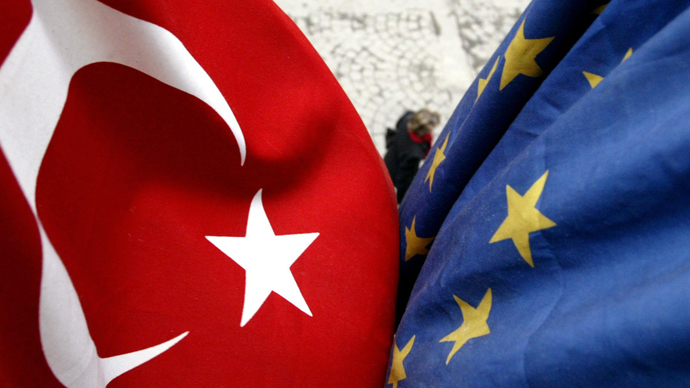Turkey may ‘never be EU member’ – Ankara negotiator

Turkey’s bid for European Union membership may fail because of “prejudiced” attitudes from current members, an EU affairs minister said on Saturday. The statement comes as the country’s domestic goals shift away from EU accession.
The statement marks Turkey’s first high-level acknowledgement that its decades-long bid for membership may never be successful.
Instead of becoming a full member of the bloc, Turkey will likely negotiate special access to the EU market just as Norway has done, The Telegraph cited Turkish EU Affairs Minister Egemen Bagis as saying. The statement was made at the 10th annual Yalta meeting, which is designed to promote European integration with Ukraine.
If Turkey were to join the EU, it would be the first Muslim nation to do so.
Meanwhile, public opinion in support of the EU bid has waned from 73 percent when accession talks began in 2004 to 44 percent in 2013, according to a German Marshall Fund report released this week.
The survey also showed that public wants Turkey to have the freedom to act alone instead of being forced to cooperate with the EU when it comes to international matters. Thirty-eight percent of Turks said their country should act alone, while 21 percent thought Turkey should cooperate with the EU.
Moreover, more than half of all Turks have an unfavorable view of the EU and believe that working with Asia is more fruitful to their national interests, according to the 2012 Transatlantic Trends Survey.
Bagis also hinted that the EU would not be in such financial trouble if Turkey had joined earlier. He added that Turkey would have been an asset due to its obedience to balanced budgets.

The minister also said that Turkey faced “prejudiced” attitudes in its EU membership ambitions, as well as in its bid to host the Olympics. No particular countries were named.
"They [the EU] should understand that they are not hurting me by putting me on the back burner. They are hurting themselves," said Bagis, adding that allowing the EU to grow “means putting prejudice away and accepting young dynamic nations like Ukraine and Turkey.”
The main opposition against Turkey’s accession - which has been frozen for three years – is France and, most recently, Germany.
Both nations have concerns about allowing a Muslim country with a population of 76 million people into the EU, citing worries of how such a culturally different nation would integrate into the bloc.
German Finance Minister Wolfgang Schaeuble frankly stated Berlin's opposition in July, saying that Turkey was not part of Europe. Germany also strongly objected Turkish authorities’ use of force against anti-goverment protesters in June.
Some of Turkey’s senior politicians have suggested that the country is strong enough to continue its development without the help of the EU.
“The process means more than the accession. Once the necessary levels are achieved, Turkey is big enough to continue its development without the accession. Our aim is to achieve a smooth accession process,” Turkey’s undersecretary of the Ministry of EU Affairs, Haluk Ilıcak, said in June.
Turkey has been showing off its cultural independence on the international stage. On Saturday, the country launched its own type of Eurovision, dubbed ‘Turkvision,’ which follows the same guidelines as the annual European song contest. The project was put in place after Turkey criticized Eurovision’s voting system last May.
Turkey has been an associate of the EU since the 1960s.














